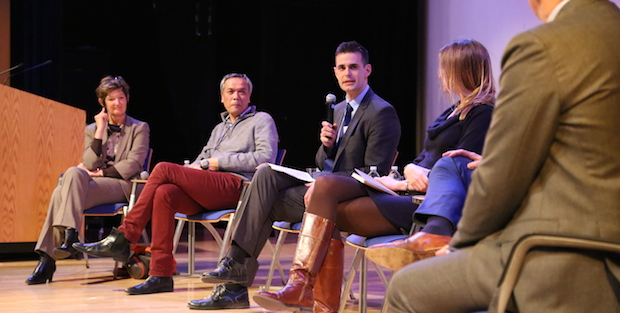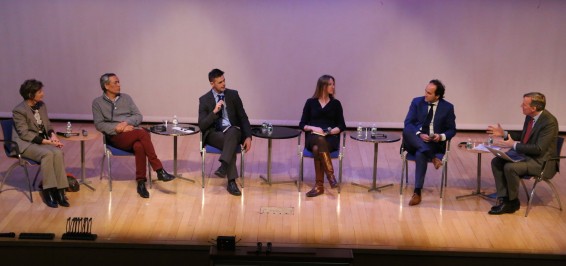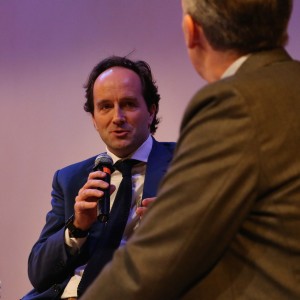Two thoughts kept coming to mind this past Thursday evening, as I listened to the remarkable discussion on social entrepreneurship taking place in the Lycée Français de New York Cultural Center. The first was one of gratitude to Pascale Richard for organizing such a brilliant event, which from the large number of people in the auditorium had clearly attracted a great deal of interest within our school community and beyond. Profound thanks also extend to the five outstanding panelists who brought such life and expertise to the theme: Brigitte Jaumel, Richard Im, Casper Sorrenson, Stephanie Potter and David Jones (for their very impressive biographies, please see here).
From left: Brigitte Jaumel, Richard Im, Casper Sorrenson, Stephanie Potter, David Jones and Sean Lynch.
And last, but certainly not least, our enduring gratitude belongs as well to the many students in attendance, particularly the eight tenth grade social entrepreneurs from the LFNY who with two members of our faculty, Marie-Odile Couture and Nathalie Roussel, launched an exemplary service learning project in Vietnam this past November and opened the night’s discussion with a moving presentation of their experience.
The holy grail of global citizenship
The second thought to which I returned again and again had to do with the words “holy grail”, defined in the Merriam-Webster dictionary as follows: “noun, something that you want very much, but that is hard to get or achieve. Example: finding a cure for cancer is the holy grail of medical researchers.” I kept reflecting on these terms because it struck me that everyone in the room on Thursday was deeply, keenly, unwaveringly interested in improving the world around them, in solving the most pressing issues facing humanity and the planet today, issues like extreme poverty, greenhouse gas emissions, unequal access to education and so on, the resolution of which might be considered in some sense the holy grail of global citizenship.
A holy grail to which those in attendance this past Thursday appeared to know the path. Without going into everything our panelists shared on the subject of social entrepreneurship, notably about the importance of qualities like creativity, leadership, teamwork and resilience in this fascinating field, there is one characteristic I wish to emphasize, a characteristic our eight young social entrepreneurs piloting the LFNY initiative in Vietnam embodied to perfection and which as I observed them making their presentation in the Cultural Center last Thursday reminded me of Percival, a figure from Arthurian legend who managed to find the holy grail of medieval lore, a highly prized object which countless Knights of the Roundtable sought, but only Percival was ever able to find.
Knights of the Roundtable
The version of the myth I prefer recounts how one knight after another would journey for years and years in search of the priceless treasure until coming across a castle buried in the heart of a dark and wild forest. After knocking on the gate of the fortress, each would have the door of the castle opened and a feast provided to him by a beautiful princess.
David Jones, at the panel on social entrepreneurship.
Later, the knight would inquire as to the whereabouts of the king to whom the fortified home evidently belonged, only to be told that the latter was extremely ill in bed and did not have enough strength to join the banquet. Taken to see the lord of the castle, the errant Knight of the Round Table would pose one question and one question only to the clearly ailing king: did his highness know where the holy grail might be found? No sooner would these words be uttered than the fortress would disappear and the knight would be lost again in the dense undergrowth.
The power of empathy
Percival, however, was different. He also wandered and wandered until he stumbled across the castle in the forest. He also feasted upon a lavish dinner. He also asked about the lord of the fortress and was led to see the sick king. What was unique about Percival was the nature of the question he put to his sick host. “Why, good lord, are you suffering,” is what Percival asked, upon which the room was filled with blinding light and the holy grail appeared!
Empathy: the key to all doors, the recipe for happiness, the essence of how we might best approach the “other” whenever we encounter him or her. That empathetic disposition is what seems to hold the secret to truly effective social entrepreneurship, whether for an individual, a non-governmental organization or a socially responsible business. It is also what we discern in our students and what we should encourage in them to the best of our abilities.
About the Author :
Sean Lynch was Head of School at the Lycée Français de New York from 2011 to 2018, after having spent 15 years at another French bilingual school outside of Paris: the Lycée International de St. Germain-en-Laye. Holding both French and American nationalities, educated in France (Sciences Po Paris) and the United States (Yale), and as the proud husband of a French-American spouse and father of two French-American daughters, Sean Lynch has spent his entire professional and personal life at the junction between the languages, cultures and educational systems of France and the United States. In addition to being passionate about education, he loves everything related to the mountains, particularly the Parc National du Mercantour.



